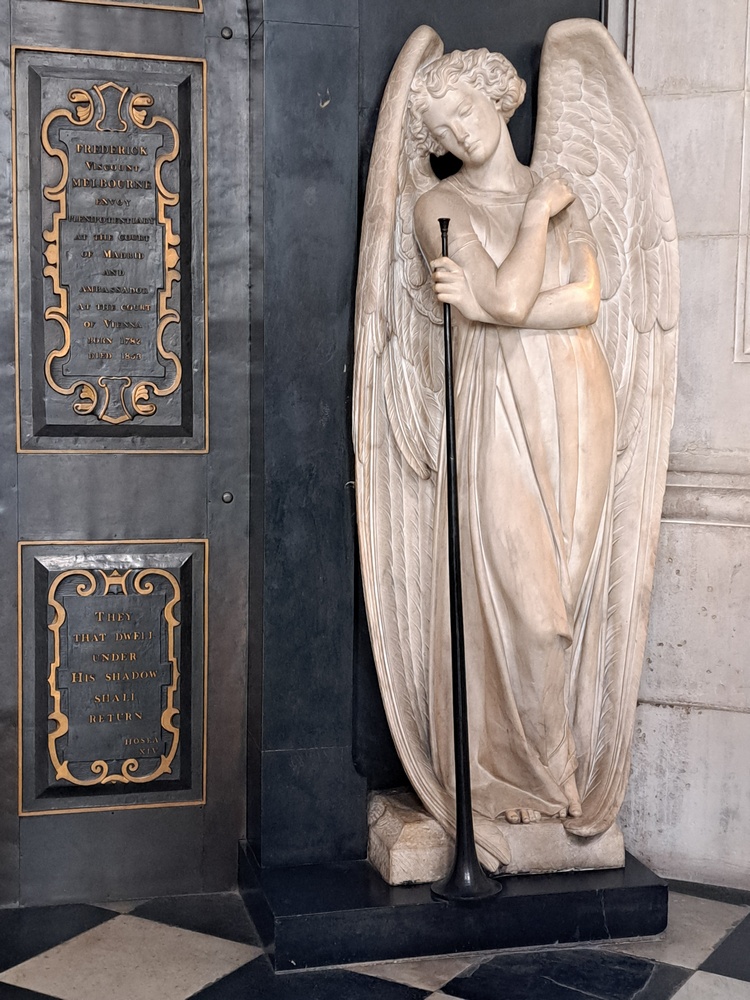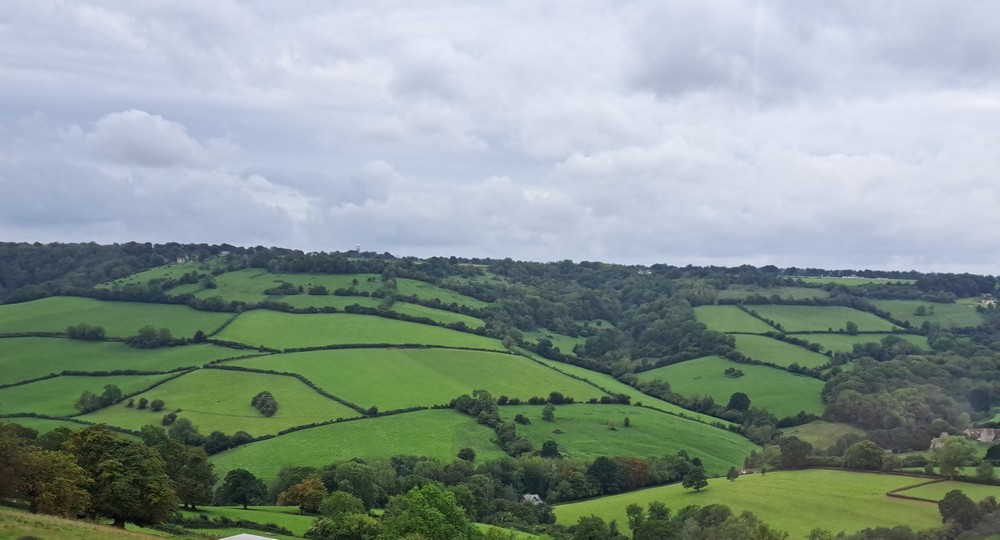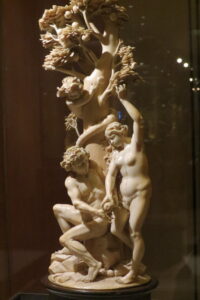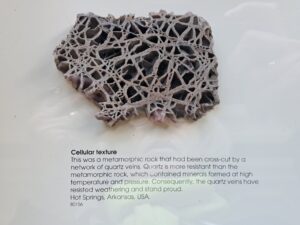
New Brunswick (c) Jamie MacDonald 2012
A: Tell me about the healing miracles that took place around you.
J: A lot of people over the centuries have tried to figure out the healing miracles reported in the Gospels. Not many have noticed that the claims made by Mark are very different from the claims made by the other gospel writers. To understand the healing miracles that took place during my ministry, the only reliable source is Mark’s gospel. My friend Lazarus — the beloved disciple — was also a reliable source. But his collection of essays and parables and sayings — the collection that’s been tentatively reconstructed by scholars and labelled the “Q source” — no longer exists in its original format. So for anyone who wants to understand what I actually taught about healing and illness, they’d need to look more closely at what Mark says.
A: I did an analysis of the healing stories in Mark, Matthew, and Luke for a New Testament course.* My professor got very huffy with me because I launched into a very un-scholarly attack on Luke’s motives in the middle of the paper. But I don’t regret pointing out the truth about Luke’s desire to paint you as a “Divine Patron of Healing.” Luke had an agenda, and his agenda had nothing to do with teaching regular people how to be in relationship with God.
J: Luke was a disciple of Paul. Young, brilliant, devoted to the cause of the Seekers of the Rock. He was very young — still in his mid-teens — when Paul died. As he grew older, he earned more responsibility in the “great cause” of spreading the agenda of “The One True Religion.” When my great-nephew wrote his anti-Pauline book — the Gospel of Mark — Luke got the job of undermining Mark’s message. The last thing the Seekers wanted was another resurgence of interest in what I actually taught (as opposed to what they said I taught).
A: Well, you were a difficult fellow. And according to them, you were seriously broken. So from their point of view they were helping you!
J (chuckling): With friends like that, who needs enemies?
A: You said recently (“The Messiah Who Misbehaved”) that Paul looked at the miracles of your ministry and decided you really had been the prophesied Jewish Messiah. But not in a good way, because you hadn’t followed the proper script, the proper path that was expected of you. So what did you do instead? What did you do that got everybody’s knickers in a knot?
J: Well, that’s the thing. What I did was so simple it’s been missed by most Christians all this time. What I did was get off my ass, stop feeling sorry for myself, stop wasting time on useless religious rituals and prayers, and go out and help people.
A: Come on. That’s way too simple.
J: The complete story is that I went out and helped other people in a holistic way, using all my heart, all my mind, all my talent, and all my strength to forge a bridge of healing with others. In other words, I helped people soul-to-soul. I helped people recognize the “rainbow bridge” within themselves, the pathway to “the kingdom of the heavens.” People were so shocked at this idea that sometimes they burst into tears. This one idea was — is — so powerful to the process of healing that I could see dramatic changes in their physical and mental state overnight. People need to know in their gut that God actually believes in them.
A: You’ve mentioned the rainbow bridge within, and this makes me think of the sign of the rainbow in God’s covenant with Noah (Genesis 9:8-17).
J: This covenant between God and all Creation as it exists on Planet Earth — a covenant of trust and healing with humanity plus every living creature and the earth itself — is the only covenant that appears in the Bible that I actually endorse. And the enduring sign of this covenant is the rainbow. So naturally, when I spoke of people entering “the kingdom of the heavens,” I had the sign of the rainbow in mind. In my day, the rainbow was seen by all cultures as the pathway that connected Heaven and Earth, the pathway travelled by divine messengers. In the Greek world, the messenger who travelled the rainbow bridge was Iris. In the Egyptian world, the messenger was Hermes Trismegistus. In the Jewish world, the messenger was Abraham.
The main point here is that almost everybody, regardless of religious tradition, believed that God or Spirit or Source or Oneness or whatever label you used for the Divine, was somewhere far away, somewhere not of this Earth, somewhere not of this place or this time. Sometimes the distance between Heaven and Earth could be closed, said the priests. But this “closing of the gap” was believed to be rare, an event reserved for extraordinary events and times such as the birth and death of a great king. It was unthinkable that God would enter the world, quietly and humbly, to heal the scabrous skin of a “leper.” God just didn’t do that sort of thing, said the great theologians of my time.
A: How did you see the connection between Heaven and Earth?
J: For me, God was not “up there.” Neither was God “in here,” in the way the Gnostic tradition speaks of “the spark within.” God the Mother and the God the Father were — are — the world around me. The world outside all other beings. Neither pantheism nor panentheism, but something different. Creation as family. It’s the closest analogy there is. Creation as family, with God the Mother and God the Father as parents who create a vast home for us, a home of “earth and air and water and fire,” parents who then step back from us, their angelic children, to allow us to understand and know ourselves as unique beings, unique consciousnesses within the family of Creation. We are not them. And they are not us. But together we live and work together as a family. They need us and we need them. It’s as simple as that.

This what your inner soul believes about who you really are.
A: So for you the world around you was not a tainted and corrupt lower sphere, a vile place to be controlled and transcended, but a strange sort of family home. A place with many rooms to be explored and understood. A place where God speaks in many languages and many voices.
J (nodding): Yes! A place where we experience the trajectory of true healing in ways that are difficult to express in words alone.
A: Including the mysterious role of forgiveness.
J: It felt to me, during my time as Jesus, that building a relationship with God and God’s angels is very much like building a bridge. Building a bridge between your heart and another person’s heart, even if the other person is a person-of-soul who has no physical 3D body! You are you, and she is she, so you can’t be that other person. But you can build a bridge to that other person. You can build a bridge of words and choices and actions and memories, a bridge of courage and devotion and gratitude and trust, and the bridge is a great source of strength, a way to “close the gap” between Heaven and Earth so you never feel alone. The bridge “feels” like the rainbow that lights your heart when you look into the sky after a passing storm. Maybe it sounds like a mushy Hallmark card, but I don’t care. This is what it feels like to know God’s presence in your life. It feels like this ephemeral thing of great beauty that alights upon your heart and soul in those times when you most need to feel the quiet touch of God’s hand upon your shoulder. What travels along this rainbow bridge is not a messenger but Divine Love itself. If you could see Creation with the eyes of an angel, you would see networks — highways — of rainbow light, bridges that connect the heart of each soul to the hearts of all other souls.
A: Like an angel Internet.
J: Actually, that’s exactly what it is — a world wide web of pure Divine Love that’s been built one small bridge at a time.
This is what I meant when I talked about the Way, the Truth, and the Life. It’s not what Paul meant when he talked about the Way, and it’s not what John meant. But, for me, the covenant with Noah was the only scriptural proof-text that made any sense. The Way means helping God in the great and mysterious and multiple tasks of healing.
First step: help heal the physical body — the physical bodies of humans and other creatures and the planet itself — as Noah once helped God heal the bodies of all creatures on Planet Earth (metaphorically speaking, of course, since the biblical account of Noah and the Great Flood was not an actual historical event ).
Second step: start to build the rainbow bridges of the heart so you can hear what God is actually saying to you!
_________________________________________________
*Excerpt from a 2009 paper entitled, “RADICAL MESSIAH: AN EXAMINATION OF HOW THE HEALING MIRACLE STORIES ARE USED IN MARK, MATTHEW, AND LUKE”
. . . The basic shape of Mark’s argument is presented in his opening verses (Mark 1:1 – 2:12). These verses offer five different healing miracle stories in quick succession after a brief introduction that starts in the countryside (not the Temple) with John the Baptist (not with a priest). These five narrative healing stories (plus eight more individual healings and assorted crowd scenes in Mark) have distinct features that make unique claims for the Jewish Messiah: (1) Jesus heals the most disadvantaged and scorned of people – the mentally ill (demoniacs), women, lepers, and paralytics (and in later chapters, Gentiles), most of whom are likely extremely poor (cf. the Beatitudes in Luke 6:20-23) – using only authority, forgiveness, word, and touch, but not prayer. (2) He heals them in synagogue, household, and outdoor settings, far removed from any sanctioned Temple, whether Jewish or Gentile. (3) All but one healing in Mark – the healing of the Syro-Phoenician girl (Mark 7: 24-30) – require that Jesus be physically present beside (or at least in visual proximity to) the person who is being healed, thus emphasizing the importance of personal relationship and compassionate presence as part of the miraculous healing process. (4) He heals on the Sabbath, regardless of what Torah and priestly custom say. (5) He rejects the purity codes of “uncleanness” as they pertain to illness, and does not equate “cleanness” with healing. (6) He does not follow the traditional medical treatments recommended in either Greek medical texts or Jewish mishnah (Cotter, Appendices A & B), and he does not use either magical amulets or Jewish religious rituals (eg. sacrificial offerings), all of which suggest he is getting divine assistance in a novel form that bypasses all previously known ways of God’s acting in the world to relieve suffering, and that obviates the need for the Jerusalem Temple. (7) He does not ask for monetary payment, and he usually does not ask for an “honour payment” of public recognition; both of these values subvert the honour/shame paradigm. (8) He does not heal everyone who comes to him in the beginning, only “many” of the people who gather in the crowd scene of 1:32-34 (although by 6:53-56, he is healing everyone). (9) Jesus does not himself bring anyone back from the dead. (In the story about Jairus’s daughter, in Mark 5:21-24, 35-43, Jesus says the girl is not dead, but sleeping; and in the Passion sequence, the young man at the tomb says that “Jesus has been raised,” not “Jesus has raised himself”). (10) All of the diseases that Jesus heals are attributable, in modern terms, to disorders of the endocrine system and central nervous system, and none involve sudden regeneration of lost limbs (which would be a truly non-Newtonian event!) (11) Jesus has no patience for “supernatural appurtenances” or the praise and honour that accompany them, yet is able to heal his patients instantly – no waiting period is required, no cleansing period is required, no special invocation of biblical memory is required, no special anything is required, except for one thing: faith on the petitioner’s part (plus, it goes without saying, divine intervention on God’s part).
Mark’s claims pose problems for the growing Christian community. In Mark’s gospel, Jesus is clearly chosen by God to carry out a mission of (1) healing and (2) teaching, but he’s not very sellable. He’s not very divine. Further, he is a Jewish Messiah who is in the Torah’s face, who is blatantly cherry-picking which laws of Torah to keep (eg. Exod. 20:12-16; Deut. 6:4-5; Lev. 19:18), and which ones to reject (eg. Exod. 31:12-17; Lev. 13:9-17; 15:25-30). (This tendency of Mark does not go down well with Matthew, who is intent on showing that Jesus fulfilled Jewish prophecy and preached the proper understanding of Torah.) In addition, Mark does not try to link the way Jesus healed people to the way in which Hebrew prophets such as Elisha healed people. Elisha, by way of contrast to Jesus, never personally meets with his illustrious patient, the Syrian general Namaan, but instead sends messengers to tell Namaan that he can be cleansed of his skin disease if he ritually bathes seven times in the Jordan River (2 Kings 5:1-14). A short while after this, Elisha punishes his greedy servant by giving him Namaan’s leprosy (as if leprosy is wrapped up in a neat little box that is within Elisha’s power to give!). Mark’s Jesus, one intuits, would not have taken kindly to a healer who claimed to have the power to purposely afflict a man and all his descendants with leprosy (2 Kings 25-27); nor would Mark’s Jesus have appreciated the way in which Elisha commissions his servant to take the staff of the man of God (a staff presumably imbued with divine healing powers) to try to heal the Shunammite woman’s dead (or possibly comatose) son. Elisha’s commission fails, and only when the boy’s mother insists does he physically visit the boy to say prayers, and so bring him back to life. According to Wendy Cotter, the Shunammite woman is not Jewish (52); however, the passage in 2 Kings shows she has faith in the god of Elisha.
At this point, it’s hard not to think of Mark’s tale of the Syro-Phoenician woman and her gravely ill daughter (Mark 7:24-30), which is the only occasion in Mark when Jesus performs a distance healing, that is, a healing on a person he hasn’t seen or touched. This is a confusing passage. We have some of the same elements as in the raising of the Shunammite woman’s son: a Gentile mother requests a healing from a man of God; the healer’s initial response is somewhat dismissive; the mother persists; the healer relents, and the child is healed. If Mark were trying to draw a connection between Elisha and Jesus, he would have shown Jesus following the mother to her home and healing the girl with prayers. Yet Mark, it seems, would rather show Jesus doing a distance healing than a prayer healing. Remarkably, Mark places the power of faith and compassionate presence ahead of the power of prayer when it comes to healing (a point further reinforced by Mark’s reiteration in 6:1-6 of one of his major premises, where he implies that Jesus has no power to heal those in his hometown because most lack faith (cf. Mt 13:58))! In Mark, prayer is important when it comes to Jesus’ personal relationship with God (eg. 1:35; 6:46;14:32), but Mark doesn’t show Jesus speaking prayers when “healing action” is taking place. Rather, Mark shows Jesus using authority (commanding demons to come out) (1:23-27; 5:1-20; 9:14-29); giving forgiveness (2:1-12); speaking words that build on or interact with the petitioner’s own faith (1:40-45; 2:1-12; 3:1-6; 5:24-34; 5:35-43; 10:46-52); touching or laying on hands (1:29-31; 6:54-56; 7:31-37; 8:22-26); and using a combination of two or more of these (eg. 5:35-43; 9:14-29). Interestingly, when the disciples ask Jesus in Chapter 9:28 why they could not cast out the “demon” of the epileptic boy (9:14-29), Jesus says to them, “This kind can come out only through prayer [and fasting].” But does Jesus mean prayer in the midst of an exorcism (similar to a televangelist’s faith healing), or does he mean prayer of the sort he conducts in private, a practice of spiritual discipline (as we would understand that term) which gradually enhances one’s ability to hear and understand God? It is not clear from the text.
















































